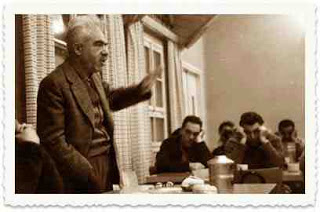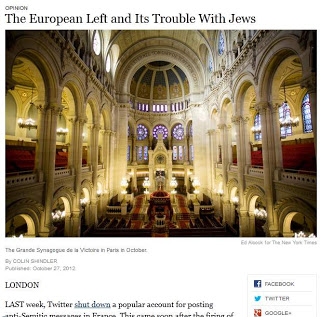 |
| Meir Yaari – one of the leaders of Mapam – well versed in the dialectics of colonialism |
 |
| Shindler’s Bleat in the Socialist New York Times |
 |
| Colin Shindler |
Colin Shindler who, for some reason, is a professor at the School of Oriental & African Studies, is virtually the sole remaining survivor of Mapam in the UK. Mapam are or rather were, ‘Marxist’ Zionists who believed you could reconcile internationalism and workers solidarity with Zionism. To them socialism and imperialism were bedfellows. It has to be said that Colin is not a particularly bright fellow and he refers talking in shallow Zionist soundbites as a substitute for any deeper analysis of the issues. But one has to take people as one finds them and it has to be admitted that it would take a genius to reconcile Zionism and socialism today.
In 1949 Mapam was the second largest party in Israel’s Knesset, with 19 out of 120 seats. See Israel’s Elections – The Death of 2 States and the Zionist Left. Today Mapam has disappeared into Meretz, the Civil Rights Party, which had a total of 3 seats in the 2009 Israeli elections. You might have thought Colin, being a professor, might have done some hard and innovative thinking about why it is that Yisrael Beteinu, party of the fascist Foreign Minister, Avigdor Lieberman (who has now joined Netanyahu’s Likud) got 5 times as many seats as the rump party of Meretz at the last general election and which gained more even than the Israeli Labour Party (13), which until 1977 had formed every single Israeli government.
 |
| Mapam on May Day Parade – socialism once a year |
Not a bit of it. Instead the trite and shallow Shindler wrote an Opinion Piece for the New York Times The European Left and Its Trouble With Jews. The NYT has just appointed ex-BBC head Mark Thompson, who is not only a Zionist rogue who prevented the Disaster Emergency Committee from making an appeal for the children and victims of Israel’s bombing of Gaza in 2009, but is in it up to his neck in the Jimmy Savile cover-up. Indeed NYT journalists are starting to call for Thompson’s head before he even takes up his post in order that the NYT avoids being tarnished by the cover up of child abuse in which Thompson is believed to have engaged. However I digress.
In his Opinion piece Shindler falsely claimed that the European left is reluctant to take a stance where anti-Zionism ‘spills over’ into anti-Semitism. He gave no examples nor could he. Instead he mentioned a few examples in France of where Islamists had targeted Jewish synagogues and schools. All reprehensible and all brought about by those such as Shindler who claim that Israel’s barbarous treatment of the Palestinians is carried out on behalf of all Jews, wherever they live. Unfortunately there are Muslim fools as well as Jewish racists who get taken in by this nonsense. However what it has to do with the Left beats me.
It would of course have been more honest if Shindler had declared his own cards and explained that he used to be a UK representative of Mapam, a ‘Marxist-Zionist’ party that found the contradictions between socialism and Zionism too difficult to reconcile and decided to choose nationalism and Zionism rather than socialism.
 |
| child pioneers – the image of a country without its indigenous populace |
Shindler could have explained how the ‘shooting and crying’ philosophy of Mapam didn’t prevent Mapam from forming the core of the Palmach shock-troops in the 1947-8 Nakba and how they were prime amongst those who massacred and expelled. How Mapam’s Kibbutz Ha’artzi Federation was also Jewish only and how Mapam’s Kibbutzim were the most eager to confiscate Arab land. The most notable case being Kibbutz Baram, which was established when the villagers of the Arab village of Birim were persuaded to vacate their lands during the fighting and promised they would be allowed back after the fighting ended. In the meantime Mapam’s ‘socialists’ took the land over and refused to relinquish it. Even Menachem Begin, the Likud leader, supported the Arab villagers!
 |
| Mapam May Day Rally |
Or Shindler could have explained why, when Israel attacked Egypt during the Suez War and Ben-Gurion was forced to withdraw his troops, Mapam stated a demonstration against withdrawal. Hardly the actions of socialist internationalists!
I know no one on the Left who has any problem at all in denouncing bomb attacks against European Jews. The real problem is that most far-right and neo-Nazi groups in Europe support Israel and Zionism! In the UK, the fascist English Defence League march with Israeli flags as they attack ‘Muslims’. A phenomenon that Shindler ‘forgot’ to mention. Just as he forgot to mention the meetings between Ron Prossor, Israel’s UN Ambassador and Marine Le Pen, who is equally hostile to Muslims.
Shindler is equally wrong to suggest that European leftists identify with Political Islam. We all know it is a reactionary political current. But we also recognise that it was western imperialism – be it in Saudia Arabia, Afghanistan or indeed the Gaza Strip in the 1980’s, where the USA and Israel itself which backed Islamists against their secular opponents. Indeed it was the Israeli government under Netanyahu in the 1980’s which helped create the very Hamas they decry today.
The suggestion Shindler makes, that there is any divorce between the Left’s hatred of Nazi Germany and its anti-colonial tradition is absurd. Socialists have always opposed Apartheid in South Africa and the colonisation of Africa and the Middle East. The Left was unanimously opposed to the Suez War and likewise Jean Paul Sartre, who Shindler quotes, was vehemently opposed, unlike Israeli ‘socialist’ Zionists, to the French colonisation of Algeria. Of course there was a generation of the European Left who were so traumatised by the Nazi genocide of the Jews that they supported a Jewish state in Palestine not realising that one wrong could not undo another. But they have long since recognised the error of their ways – people like Tony Benn and even Gerald Kaufmann.
But perhaps Shindler has forgotten what Marx wrote in respect of Ireland and the British working class. ‘A nation that oppresses another nation shall not itself be free.’
What Shindler cannot and will not understand is that a ‘Jewish’ state in the context of support by western imperialism, cannot be other than one in which being Jewish means being privileged. That is demonstrated in the Ha’aretz opinion poll of 23rd October in which 59 percent, supported preference for Jews over Arabs in admission to government jobs, 49 percent wanted the state to treat Jewish citizens better than Arab ones and 42 percent didn’t want to live in the same building with Arabs and 42 percent don’t want their children in the same class with Arab children.
This is the ugly reality that Professor Colin Shindler, in his berating of the European left chooses to ignore. Unfortunately the idea of Jewish jobs and Jewish land were not inventions of the right-wing Zionists but his socialist Zionist compatriots. It was not Likud who campaigned in the 1920s and 1930s for Jewish Labour, Land and Produce but the Labour Zionists, Hashomer Hatzair (Mapam’s forerunners) included.
The real story that Shindler doesn’t tell is that ‘socialist’ Zionism only came about as an attempt to reconcile the irreconcileable. Zionism began by rejecting the fight against anti-Semitism. However the Jewish masses of the Russian Pale of Settlement first and foremost had to defend themselves against the pogromists. It was impossible, if Zionism was to achieve any base, for them to abstain entirely from the fight against the anti-Semites. Socialist Zionism was always a hybrid creature. In Russia, Poalei Zion collapsed into the Bolsheviks and in Warsaw in the fight against the Nazis, Left Poalei Zion (there was also a Right PZ), which the historian Emanuel Ringelblum of Oneg Shabbat was a member of, joined forces with the anti-Zionist Bund and was virtually an anti-Zionist group itself by the end.
Socialist Zionism was always a miserable creature and it is better that Zionism has come out in its true colours. However there are still one or two left-overs from the ‘socialist’ Zionists, like Colin Shindler, who have learnt nothing from their abject defeat.
Tony Greenstein
Opinion
The European Left and Its Trouble With Jews
LAST week, Twitter shut down a popular account for posting anti-Semitic messages in France. This came soon after the firing of blanks at a synagogue near Paris, the discovery of a network of radical Islamists who had thrown a hand grenade into a kosher restaurant, and the killing of a teacher and young pupils at a Jewish school in Toulouse earlier this year. The attacks were part of an escalating campaign of violence against Jews in France.
Today, a sizable section of the European left has been reluctant to take a clear stand when anti-Zionism spills over into anti-Semitism. Beginning in the 1990s, many on the European left began to view the growing Muslim minorities in their countries as a new proletariat and the Palestinian cause as a recruiting mechanism. The issue of Palestine was particularly seductive for the children of immigrants, marooned between identities.
Capitalism was depicted as undermining a perfect Islamic society while cultural imperialism corrupted Islam. The tactic has a distinguished revolutionary pedigree. Indeed, the cry, “Long live Soviet power, long live the Shariah,” was heard in Central Asia during the 1920s after Lenin tried to cultivate Muslim nationalists in the Soviet East once his attempt to spread revolution to Europe had failed. But the question remains: why do today’s European socialists identify with Islamists whose worldview is light-years removed from their own?
In recent years, there has been an increased blurring of the distinction between Jew, Zionist and Israeli. Hassan Nasrallah, the leader of the militant group Hezbollah, famously commented: “If we searched the entire world for a person more cowardly, despicable, weak and feeble in psyche, mind, ideology and religion, we would not find anyone like the Jew. Notice I do not say the Israeli.”
Whereas historically Islam has often been benevolent toward Jews, compared to Christianity, many contemporary Islamists have evoked the idea of “the eternal Jew.” For example, the Battle of Khaybar in 629, fought by the Prophet Muhammad against the Jewish tribes, is recalled in victory chants at Hezbollah rallies: “Khaybar, Khaybar, O Jews, the army of Muhammad will return,” and the name Khaybar sometimes graces Hezbollah rockets aimed at Israel.
Many contemporary Islamists see little difference between the Jewish opponents of the prophet in seventh-century Arabia and Jews today. Importing old symbols of European anti-Semitism — depictions of Jews as enemies of God or proclamations of a worldwide Jewish conspiracy — has helped cement such imagery. If there is a distinction between Islamic anti-Judaism and modern anti-Semitism, it has been lost on French Islamists.
The fear of Jewish domination of the Middle East has become a repetitive theme in the Islamist media — which has become more influential as religious parties have gained ground in the wake of the Arab Spring. This is a factor in the general refusal of the militant groups Hezbollah and Hamas to publicly meet members of the Israeli peace camp — a far cry from when Palestinian nationalists willingly negotiated with dovish Israelis before the 1993 handshake between Yitzhak Rabin and Yasir Arafat on the White House lawn.
The old left in Europe was forged in the struggle against local fascists in the 1930s. Most of Europe experienced a brutal Nazi occupation and bore witness to the atrocities of the Holocaust. The European left strongly identified with Jewish suffering and therefore welcomed the birth of the state of Israel in 1948. Some viewed the struggle for Israel in the same light as the fight for freedom in the Spanish Civil War.
But the succeeding generation of the European left did not see things this way. Its frame of reference was the anticolonial struggle — in Vietnam, South Africa, Rhodesia and a host of other places. Its hallowed icon was not the soldier of the International Brigades who fought against Franco in Spain, but Che Guevara — whose image adorned countless student bedrooms. Anticolonialism further influenced myriad causes, from America’s Black Panthers in the 1960s to Hugo Chávez’s Bolivarian revolution in Venezuela today.
It began with Israel’s exclusion from the ranks of the nonaligned nations more than 50 years ago, when Arab states refused to attend a 1955 nonaligned conference in Indonesia if an Israeli delegate was present. The Jewish state was snubbed in favor of such feudal kingdoms as Saudi Arabia, Libya and Yemen. And Israel’s collusion with imperial powers like Britain and France during the Suez crisis the following year cemented its ostracism.
Given the deep remorse for the misdeeds of colonialism, it was easier for the New Left of the 1960s to identify with the emerging Palestinian national movement than with the already established social democratic Israel. This deepening hostility toward Israel was present in Europe before the 1967 Arab-Israeli war and before the rush to build settlements on the West Bank.
AMID this rising hostility toward Israel, the French philosopher and political activist Jean-Paul Sartre advocated a different way forward. He was scarred by the memory of what had happened to France’s Jews during World War II — the discrimination, betrayals, deportations and exterminations. He understood the legitimacy of Israel’s war for independence and later commented that the establishment of the state of Israel was one of the few events “that allows us to preserve hope.” Yet Sartre also strongly supported Algeria’s fight for independence from France.
This double legacy of supporting Israel and the Algerian struggle symbolized the predicament of the entire postwar European left. Sartre argued that the left shouldn’t choose between two moral causes and that it was up to the Jews and the Arabs to resolve their conflict through discussion and negotiation. Sartre tried to create a space for a dialogue, lending his name and prestige to private and public meetings between the two sides such as the Comité Israël-Palestine in the 1970s. His approach reached its apogee with the many quiet meetings between Israelis and Palestinians in Europe that eventually led to the Oslo accords. But Sartre’s vision was stymied as Israeli settlements proliferated after 1977, strengthening the left’s caricature of Israel as an imperialist power and a settler-colonial enterprise. Some prominent voices on the European left have mouthed time-honored anti-Semitic tropes in their desire to appear supportive of the Palestinian cause. Ken Livingstone, a former newspaper editor and mayor of London, has a long history of insensitive remarks about Jews — from publishing a cartoon in 1982 of Menachem Begin, then Israel’s prime minister, in Gestapo uniform atop a pile of Palestinian skulls to likening a known Jewish reporter to “a concentration camp guard” 20 years later. Today, he contributes to Press TV, the English-language outlet for the Iranian government.
Sometimes the left distinguishes between vulnerable European Jews who have been persecuted and latter-day “Prussians” in Israel. Yet it is often forgotten that a majority of Israelis just happen to be Jews, who fear therefore that what begins with the delegitimization of the state will end with the delegitimization of the people.
Such Israelophobia, enunciated by sections of the European left, dovetailed neatly with the rise of Islamism among Palestinians and throughout the Arab world. The Islamist obfuscation of “the Jew” mirrored the blindness of many a European Marxist. Despite the well-intentioned efforts of many Jews and Muslims to put aside their differing perspectives on the Israeli-Palestinian conflict, the offensive imagery of “the Jew” has persisted in many immigrant communities in Western Europe. Islamists were willing to share platforms with socialists and atheists, but not with Zionists.
The New Left’s profound opposition to American power, and the convergence of reactionary Islamists and unquestioning leftists was reflected in the million-strong London protest against the invasion of Iraq in 2003. It was organized by the Muslim Association of Britain, the Trotskyist Socialist Workers Party and the Stalinist Communist Party of Britain. When some Muslims voiced apprehension about participating in the protest with non-Muslims, the M.A.B. leadership decreed that it was religiously permissible if halal food was provided and men and women were given separate areas. Such displays of “reactionary clericalism,” as the early Bolsheviks would have called it, were happily glossed over.
Sartre understood that the conflict was not simply between Israelis and Palestinians, but between those advocating peace on both sides and their rejectionists. This conflict within the conflict is something that many on Europe’s left, as they ally themselves with unsavory forces, still fail to comprehend.
Instead, the swallowing up of both the Israeli and Palestinian peace camps by political polarization has accelerated the closing of the progressive mind. And static fatalism has allowed the assailant of synagogue congregants and the killer of young children to fill the vacuum.
Colin Shindler is an emeritus professor at the University of London’s School of Oriental and African Studies and the author of “Israel and the European Left: Between Solidarity and Delegitimization.”This article has been revised to reflect the following correction:
Correction: October 28, 2012
An earlier version of this article misstated the city in France where a teacher and pupils at a Jewish school were killed earlier this year. It was Toulouse, not Strasbourg.
In addition, the biographical note misstated the name of the institution where the writer, Colin Shindler, is a professor. It is the School of Oriental and African Studies — not the School of African and Oriental Studies — at the University of London.